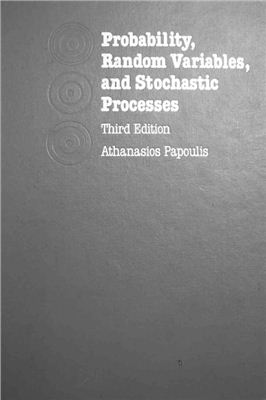Издательство McGrow-Hill, 2002, -678 pp.
Качество среднее (серый фон).
This text is a classic in probability, statistics, and estimation and in the application of these fields to mode engineering problems. Probability, Random Variables, and Stochastic Processes assumes a strong college mathematics background. The first half of the text develops the basic machinery of probability and statistics from first principles while the second half develops applications of the basic theory. Topics in the first section include probability distributions and densities, random variables and vectors, expectations, covariance, correlations, functions of random variables and vectors, and conditional distributions and densities. In this third edition of the text, the second half of the book has been substantially updated and expanded to include new or revised discussions of the following topics: mean square estimation, likelihood tests, maximum entropy methods, Monte Carlo techniques, spectral representations and estimation, sampling theory, bispectra and system identification, cyclostationary processes, deterministic signals in noise, and the Wiener and Kalman filters. Probability, Random Variables, and Stochastic Processes covers a remarkable density of material and the clarity of both presentation and notation make this book invaluable as a text and a reference.
The fourth edition of this book has been updated significantly from previous editions, and it includes a coauthor. About one-third of the content of this edition is new material, and these additions are incorporated while maintaining the style and spirit of the previous editions that are familiar to many of its readers.
The basic outlook and approach remain the same: To develop the subject of probability theory and stochastic processes as a deductive discipline and to illustrate the theory with basic applications of engineering interest. To this extent, these remarks made in the first edition are still valid: The book is written neither for the handbook-oriented students nor for the sophisticated few (if any) who can lea the subject from advanced mathematical texts. It is written for the majority of engineers and physicists who have sufficient maturity to appreciate and follow a logical presentation. There is an obvious lack of continuity between the elements of probability as presented in introductory courses, and the sophisticated concepts needed in today’s applications. Random variables, transformations, expected values, conditional densities, characteristic functions cannot be mastered with mere exposure. These concepts must be clearly defined and must be developed, one at a time, with sufficient elaboration.
Part I Probability and random variables.
The Meaning of Probability 3.
The Axioms of Probability.
Repeated Trials.
The Concept of a Random Variable.
Functions of One Random Variable.
Two Random Variables.
Sequences of Random Variables.
Statistics.
Part II Stochastic processes.
Random Walks and Other Applications.
Spectral Representation.
Spectrum Estimation.
Mean Square Estimation.
Entropy.
Markov Chains.
Markov Processes and Queueing Theory.
Качество среднее (серый фон).
This text is a classic in probability, statistics, and estimation and in the application of these fields to mode engineering problems. Probability, Random Variables, and Stochastic Processes assumes a strong college mathematics background. The first half of the text develops the basic machinery of probability and statistics from first principles while the second half develops applications of the basic theory. Topics in the first section include probability distributions and densities, random variables and vectors, expectations, covariance, correlations, functions of random variables and vectors, and conditional distributions and densities. In this third edition of the text, the second half of the book has been substantially updated and expanded to include new or revised discussions of the following topics: mean square estimation, likelihood tests, maximum entropy methods, Monte Carlo techniques, spectral representations and estimation, sampling theory, bispectra and system identification, cyclostationary processes, deterministic signals in noise, and the Wiener and Kalman filters. Probability, Random Variables, and Stochastic Processes covers a remarkable density of material and the clarity of both presentation and notation make this book invaluable as a text and a reference.
The fourth edition of this book has been updated significantly from previous editions, and it includes a coauthor. About one-third of the content of this edition is new material, and these additions are incorporated while maintaining the style and spirit of the previous editions that are familiar to many of its readers.
The basic outlook and approach remain the same: To develop the subject of probability theory and stochastic processes as a deductive discipline and to illustrate the theory with basic applications of engineering interest. To this extent, these remarks made in the first edition are still valid: The book is written neither for the handbook-oriented students nor for the sophisticated few (if any) who can lea the subject from advanced mathematical texts. It is written for the majority of engineers and physicists who have sufficient maturity to appreciate and follow a logical presentation. There is an obvious lack of continuity between the elements of probability as presented in introductory courses, and the sophisticated concepts needed in today’s applications. Random variables, transformations, expected values, conditional densities, characteristic functions cannot be mastered with mere exposure. These concepts must be clearly defined and must be developed, one at a time, with sufficient elaboration.
Part I Probability and random variables.
The Meaning of Probability 3.
The Axioms of Probability.
Repeated Trials.
The Concept of a Random Variable.
Functions of One Random Variable.
Two Random Variables.
Sequences of Random Variables.
Statistics.
Part II Stochastic processes.
Random Walks and Other Applications.
Spectral Representation.
Spectrum Estimation.
Mean Square Estimation.
Entropy.
Markov Chains.
Markov Processes and Queueing Theory.

